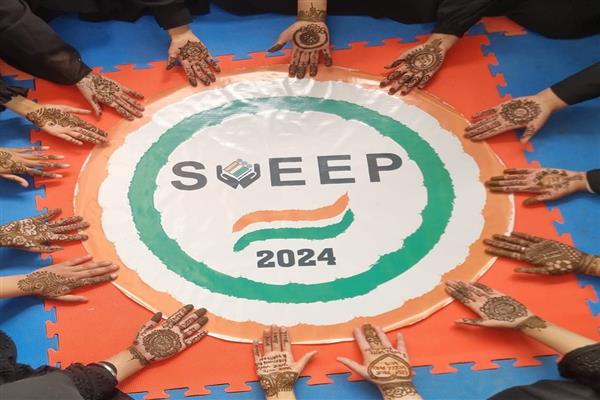Kashmir Magazine By : Kashmir Magazine | Srinagar, Publish Date: Saturday, June 15, 2024 1:11:47 PM | Updated Date : Saturday, June 15, 2024 1:11:47 PM

Saqib Malik
The Hajin area of Sonawari Assembly constituency in District Bandipora has recorded an unprecedented voter turnout of 64.73% in the General Elections to the Lok Sabha 2024, marking a significant leap from the just 36% turnout in the 2019 elections, a period marred by violence, threats, and voter boycotts.
Historically known for its turbulent past, Hajin had been a bastion of violent disruptions, witnessing intense militancy in the early 1990s followed by the rise of the counter-terrorism militia Ikhwan, and yet again renewed militant activities from 2014 to 2019. These factors severely disrupted the electoral process, resulting in minimal voter turnout and virtually no campaign activities by political parties.
However, the 2024 elections have painted a vastly different picture with areas hitherto known for minimum or no voter turnout turning out to cast their votes in huge numbers. Notably, polling stations such as Hajin L and Hajin M, which recorded zero turnout in 2019, saw an impressive voter participation of 84.38% and 86.93%, respectively. Hajin H followed suit with a turnout of 74.10%, a stark contrast to the single vote cast in 2019.
Adding to the uniqueness of this election cycle, this record turnout has been achieved despite the fact that Sonawari Assembly Constituency did not feature any prominent local candidates for the contesting Baramulla Parliamentary Constituency. This absence led to a subdued campaign presence by political parties in the Hajin areas compared to other Assembly Segments like Langate, Handwara, and Baramulla, where local candidates drew significant attention and resources. The lack of visible political campaigning placed even greater importance on the grassroots voter outreach and awareness activities spearheaded by the government.
The improved law and order situation following the abrogation of Article 370 in August 2019 also played a crucial role in ensuring a peaceful and incident-free election environment which enabled & encouraged the Government functionaries to take an out-of-box approach in their outreach and awareness activities.
The remarkable turnaround in Hajin’s voter turnout is primarily attributed to the intensive voter awareness and outreach initiatives under the Systematic Voters’ Education and Electoral Participation (SVEEP) program, led by Sub Divisional Magistrate (SDM) Sumbal, Aamir Choudhary. Serving as the Assistant Returning Officer (ARO) for the Sonawari Assembly Segment, who meticulously planned and executed a series of innovative and targeted activities that resonated with the local populace.
Key initiatives under SVEEP included the Tonga Rally, aimed at engaging individuals associated with traditional horse-drawn carriages, and a Multi-Lingual Poetry Recitation Program (Mushaira) themed “Jashn-e-Jamhooriyat” (Grand Celebration of Democracy). These activities tapped into the rich literary history and cultural preferences of the region, fostering a deeper connection with the electoral process.
Moreover, the first-ever Pink Conclave brought together women from all walks of life to engage in positive debates and discussions about the significance of electoral participation. Complementing these efforts were a series of events such as Painting Competitions, Debates, Discussions, and Mehndi Competitions (decorating hands with democratic motifs) held across various schools and colleges.
A pivotal role was also played by the Booth Level Awareness Groups (BAGS), comprising Booth Level Officers (BLOs), Anganwadi Workers, Accredited Social Health Activists (ASHAs), Chowkidars, Lumbardars, and local volunteers. These groups conducted door-to-door campaigns, spreading awareness about voter participation and the importance of electoral engagement.
Speaking about the meticulous planning behind these initiatives, SDM Sumbal, Aamir Choudhary, who also serves as the Assistant Returning Officer for the Sonawari Assembly Segment said, “We aimed to make a maximum impact by tailoring our activities to the local culture and interests with special focus on areas having witnessed least voter turnout in GEL-2019. Our target was to achieve a voter turnout of around 70%, and while we narrowly missed this, the turnout of 64.73% is a historic achievement for Hajin. The engagement through culturally relevant programs, along with the dedicated efforts of our Booth Level Awareness Groups, played a crucial role in this success.”
The remarkable increase in voter turnout is also reflected in the impressions of local residents. Gulzar Ahmad, a school teacher from Hajin, expressed his astonishment, saying, “I have never seen such enthusiasm for voting in our area. The initiatives like the poetry recitation and Pink Conclave truly touched the hearts of many, making us feel a part of the democratic process.”
Abdul Rehman Bhat, President of the Tonga Association in Hajin, expressed his appreciation for this unique outreach effort, stating, “This is the first time we have seen such an initiative from the government. The Tonga Rally not only acknowledged our traditional profession but also encouraged us to participate in the electoral process. It made us feel valued and included in the democratic journey of our region. The engagement has been inspiring and has strengthened our belief in the power of our votes.”
Similarly, Nasreen Bano, a participant in the Pink Conclave, shared her excitement, “For the first time, I felt that my voice mattered. The discussions were empowering and made me realize the importance of my vote. It was a proud moment for all women in Hajin.”
Local shopkeeper Farooq Lone also echoed the positive sentiments, “The SVEEP activities were not just events; they were a celebration of our identity as voters. The peaceful environment and proactive efforts of the administration, including door to door campaigns, encouraged many, including myself, to cast our votes without fear.”
As the 2024 elections conclude, the substantial increase in voter turnout in Hajin stands as a powerful example of how dedicated efforts in voter education and outreach can transform democratic participation, even in regions with a troubled history.